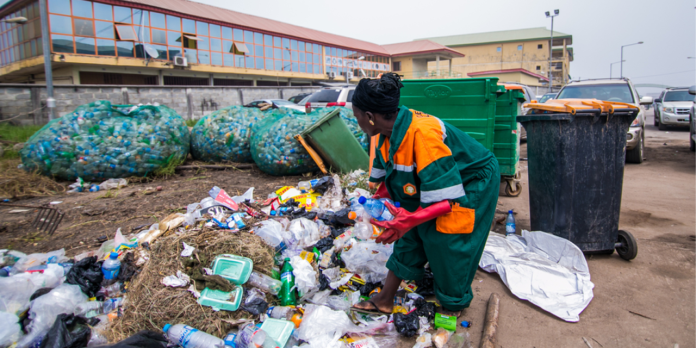Over the years, waste segregation has been preached to Ghanaians.
Despite the sensitisation, it appears that most Ghanaians do not practice waste segregation, possibly due to their laziness or ignorance of its importance.
Looking at the serious effects plastic pollution has on our environment, waste segregation and proper management of plastics have become crucial, and we must all get involved to save the environment.
Currently, I am enjoying separating my pure water sachets, water bottles, and other plastics from the organic waste I generate at home.
I have seen people pick up pure water sachets around over time, and recently, I drew closer to one.
After segregating the waste, I asked him, Why does he pick the pure water sachets, and where does he send them?
He told me there are people who buy plastics specifically from households.
Naturally, I gave him all the plastics we had collected, and the joy on his face is beyond description.
I must admit that I feel a sense of fulfillment when I separate the plastics from the other waste, not only because I have to do so but also because it reduces the volume of refuse in the bin.
I also asked the tricycle-based waste collectors if they typically segregate the waste they collect.
Whatever you give them, they will transport it to the dumpsite and dispose of it there.
For those who enjoy visiting beaches, I believe it can be disheartening to see plastic waste swimming right next to you while you’re enjoying yourself.
This phenomenon has the potential to significantly alter your mood. Naturally, fish encounter this issue frequently due to the plastic waste pollution in most of our water bodies.
Check around your neighborhood; let us look at the environment. Isn’t it disheartening to see plastic waste fly all over the streets, drains, and even at points where people sell food?
Over the years, there have been many recommendations by stakeholders on how to manage plastic waste in the country, and one of them is segregation.
In 2019, Zoomlion, the company that manages waste in several Ghanaian cities, commissioned a recycling plant in Accra.
The plant transforms waste into fertilizer and raw materials for industry.
In concrete terms, Messers Komptech’s installed machines separate, crush, and process two equivalent tonnage flows.
In an interview with the operations supervisor at Zoomlion Ghana Limited, Ricky Anokye Frimpong, he tells us that segregation of waste, especially at the point of generation, is crucial for several reasons, especially in the context of environmental sustainability and climate change.
Segregating waste at the source allows for more effective sorting of materials like paper, plastics, glass, and metals. Reducing contamination levels enables higher-quality recycling processes. It also increases recycling rates, which in turn reduces long hours of processing, energy consumption, and greenhouse gas emissions associated with the extraction and manufacturing of bye products.
“Segregating waste allows for the separate collection of recyclables and other materials intended for specific processing facilities, thereby reducing the volume of waste that ends up at the landfill site.” This will extend the life span of the limited landfills currently in use,” he noted.
Again, he stated, “Overall, there will be a reduction in the amount of waste that ends up at the landfills, which will reduce the frequency of truck travel. This will have a corresponding impact on the wear and tear of trucks, the road networks to landfill destinations, and the fuel consumption and greenhouse gas emissions from waste collection vehicles.”
Let us look at the benefits of waste segregation and recycling of plastic waste for the country.We can analyze the benefits of waste segregation and recycling of plastic waste to Ghana using the PESTLE (Political, Economic, Social, Technological, Legal, and Environmental) framework.
Political:
Demonstrating commitment to sustainable practices enhances a country’s reputation globally; it allows for stronger diplomatic ties with other nations, particularly those with similar environmental goals, and can also lead to participation in international agreements and collaborations focused on climate change mitigation.
Economic:
Waste segregation reduces costs associated with waste disposal and landfill management; it stimulates employment in recycling industries and associated sectors.
With this, recyclables and valuable materials (e.g., plastics) get back into production, reducing the need for virgin resources.
Also, investing in sustainable practices, such as waste recycling, can spur innovation and economic growth.
It also attracts investment from environmentally conscious businesses and organizations.
Social:
Waste segregation promotes community participation in environmental initiatives, reduces litter and pollution, improves overall public health and well-being, and raises awareness among citizens about waste management and environmental conservation.
Technological:
Waste segregation drives technological advancements in recycling processes and waste segregation technologies and improves efficiency in waste collection, sorting, and processing through advanced technologies.
Legal
Waste segregation ensures compliance with waste management regulations and standards, as well as minimizes legal liabilities associated with improper waste disposal and environmental damage.
Environmental:
Waste segregation mitigates environmental pollution, particularly marine pollution from plastic waste, by reducing the extraction of raw materials and energy consumption in manufacturing processes.
Additionally, it reduces greenhouse gas emissions linked to waste decomposition and raw material manufacturing, while also reducing the obstruction of our drains and water bodies, which in turn prevents floods.
What has been the attitude of Ghanaians towards waste segregation?
Ricky Anokye Frimpong helps us understand that Ghanaians’ current attitude towards waste segregation is largely unenthusiastic.
He explained that this is primarily due to Ghana’s long-standing traditional waste management practices, which have typically relied on communal waste disposal without any form of segregation.
Furthermore, he stated that the existing infrastructure does not provide accessible recycling facilities, thereby discouraging efforts towards waste segregation.
Other factors contributing to the lack of responsiveness to waste segregation and recycling, Ricky Anokye Frimpong said, include limited public awareness and education on the benefits and methods of waste segregation, insufficient governmental policies and incentives to promote recycling, and economic constraints that prioritize immediate concerns over sustainable practices.
Additionally, he stated that the inconsistent collection and disposal services have led to public skepticism about the effectiveness of segregating waste, further hindering progress in this area.
Way Forward
To address these challenges, he said it is crucial to implement continuous educational initiatives, foster community engagement to encourage behavior change, and develop the necessary infrastructure and
Resources to support and sustain effective waste segregation and recycling efforts are available.
Recycling Plants
Ricky Anokye Frimpong confirmed that the recycling plants provide sustainable waste management solutions that complement landfill sites across all regions.
He claims that informal waste operators, who previously engaged in indiscriminate dumping in drains, along main roads, and in hidden areas within our communities, primarily use these facilities.
He said these recycling plants have made significant strides in improving sustainable waste management efforts, adding that they have reduced the volume of waste directed to landfills, thereby extending their lifespan and mitigating environmental pollution.
Furthermore, he stated that by integrating recycling plants into the formal waste management system, he has created economic opportunities for informal waste collectors.
This integration, he stated, has not only enhanced the efficiency of waste collection but also contributed to cleaner urban environments and improved public health.
Moreover, he stated that the presence of regional recycling plants has fostered a culture of recycling and waste segregation among residents.
He explained that these plants have raised awareness about the importance of sustainable waste management practices through community engagement and education initiatives.
As a result, he said there has been a gradual shift in public behavior towards more responsible waste disposal and recycling.
Sensitisation
Ricky Anokye Frimpong made it known that Zoomlion has undertaken several initiatives to sensitize Ghanaians on waste segregation and recycling.
He noted that Zoomlion regularly organizes educational campaigns in communities and public places that focus on teaching the importance of waste segregation and the benefits of recycling.
Through the establishment of Zoom Kids in major schools, he said Zoomlion has effectively educated students over the years on waste management, waste segregation, proper disposal methods, and recycling.
He noted that the company leverages various media platforms, including television, radio, and social media, to spread awareness about proper waste management practices.
Again, he stated that Zoomlion collaborates with government agencies and non-governmental organizations (NGOs) to promote waste segregation and recycling, adding that these partnerships often result in joint campaigns, projects, and events aimed at improving waste management practices.
Ricky Anokye Frimpong stated that Zoomlion provides waste bins and recycling facilities in strategic locations to encourage waste segregation at the source. They distribute color-coded bins to help people easily separate their waste into categories like plastics, organic waste, and general waste.
To further enhance waste segregation and recycling sensitization efforts, he stated Zoomlion Ghana Limited is adopting some innovative methods, and these include developing a mobile application that provides information on waste segregation, recycling tips, and local recycling centers.
The app, he said, could include features such as waste collection schedules, alerts for community clean-up events, and rewards for users who actively participate in recycling programs.
Additionally, it plans to implement gamified programs that allow individuals or communities to earn points for properly segregating and recycling waste.
Again, it intends to introduce smart waste bins equipped with sensors that can detect and categorize waste. These bins have the potential to offer users immediate feedback on appropriate disposal methods and monitor the quantity of recycled waste, thereby providing valuable insights and promoting improved habits.
Once again, the plan is to utilize augmented reality to create engaging and interactive educational campaigns, as well as establish community recycling hubs where residents can bring their segregated waste for recycling.
Proper disposal and recycling.
Let us look at climate change. How does mismanagement of plastic waste contribute to climate change? Also, what role does waste segregation play in climate change?
Greenhouse gas emissions:
Production and Incineration: The production of plastics is highly energy-intensive and relies heavily on fossil fuels, leading to substantial greenhouse gas emissions. Additionally,
The incineration of plastic waste releases carbon dioxide and other harmful gases into the atmosphere.
Another point is decomposition: plastics do not biodegrade easily. When they do break down under environmental conditions, they release methane and ethylene, potent greenhouse gases that
contribute to global warming.
Carbon Footprint:
In this context, we will examine lifecycle emissions. The entire lifecycle of plastic, from raw material extraction to production, transportation, and disposal, contributes significantly to the carbon footprint; therefore, reducing plastic use and improving waste management can substantially lower these.
emissions.
Ocean acidification and temperature rise:
Let’s explore the issue of chemical contamination. Plastics often contain toxic chemicals that can leach into the water and enter the food chain, affecting the health of marine organisms and, ultimately, humans who consume seafood.
Heat Absorption: The presence of plastic debris alters the ocean’s surface properties, potentially altering its ability to reflect sunlight and absorb heat.
temperature rise.
What role does Zoomlion play in climate change?
Ricky Anokye Frimpong noted that Zoomlion Ghana Limited has a multifaceted approach and extensive collaborations significantly contribute to effective waste management, environmental health, and climate change mitigation in Ghana.
He said Zoomlion is involved in waste-to-energy projects that convert waste into usable energy, thereby reducing the amount of waste sent to landfills and cutting down on greenhouse gas emissions.
He stated that the company promotes recycling and reusing materials, as well as helping to lower the carbon footprint associated with the production of new plastics and other materials. It also participates in reforestation projects that help sequester carbon dioxide, contributing to climate change mitigation. Again, it creates and maintains green spaces in urban areas, improves air quality, and provides natural carbon sinks.
I asked a resident in Europe about their waste management practices, and this is what he had to say. He said they have the attitude of separating waste, especially the plastic waste, from the organic waste. Although segregating waste doesn’t require human intervention, it is a common practice in almost every home.
Let us look at other countries.
Other African countries, such as Senegal, Tunisia, and Ivory Coast, have taken bold steps to address the issue of plastic waste pollution by resorting to recycling these plastic wastes.
The recycling sector not only helps manage plastic waste; the country generates fertilizers from recycled waste while also providing jobs for people.
How can we benefit as a nation without starting somewhere? Are we always going to depend on the government to make a move?
Of course, we’ve installed the recycling plants. But how do the recyclers collect all the plastics from each home so that they can recycle them?
It starts with you. Even if you want to send your waste to the refuse dump, segregating it is key.
Also read: Porcia Oforiwaa writes: Stop carrying germs around! Frequent handwashing is a must, not an option.
Read Also: Porcia Oforiwaa writes: Stop carrying germs around! Frequent handwashing is a must, not an option
Ghana| Atinkaonline.com| Porcia Oforiwaa Ofori

























